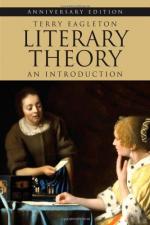|
This section contains 448 words (approx. 2 pages at 400 words per page) |

|
Literary Theory: An Introduction Summary & Study Guide Description
Literary Theory: An Introduction Summary & Study Guide includes comprehensive information and analysis to help you understand the book. This study guide contains the following sections:
This detailed literature summary also contains Topics for Discussion and a Free Quiz on Literary Theory: An Introduction by Terry Eagleton.
Terry Eagleton's Literary Theory: An Introduction is a critical overview of the history of literary theory starting just before the emergence of the Romantic movement in eighteenth-century England and ending with the post-Structuralists in 1970s and 1980s. Through this historical approach, Eagleton explores the questions "What is literature?" and "What is literary theory?" After undermining the answers various schools of thought give to this answer, he concludes that literature is simply a social construct and literary theory, therefore, is an artificial discipline.
Eagleton begins the book by raising the difficulty of defining literature and, therefore, of defining literary theory. After supplying a few provisional solutions that all fail, he concludes that literature is an unstable category which varies greatly according to social, political, and cultural circumstances. As a result of its close connection with social and political factors, literature is intimately connected with the persistence, or abolition, of a society's power structures.
To illustrate this fact, Eagleton begins the body of the work by examining the history of literature. Literature is consistently shown to be a construct intended to conform the middle-class with upper-class values, which is even explicitly the goal of Matthew Arnold. A few schools of thought rise up to combat this, but ultimately undermine their own aims by lack of political action and implicit submission to the ruling class. Focus then shifts to Germany, where the philosophies of Husserl and Heidegger greatly influence literary theory. The invention of structuralist linguistics by Saussure leads to an entirely new paradigm of literary analysis in the early twentieth century known as structuralism, which focuses primarily on the form rather than the content of literary works.
However, structuralism is ultimately flawed, and elements of it are incorporated into the linguistic and philosophical system known as post-structuralism, which is largely indebted to the work of Jacques Derrida. Post-Structuralism is dedicated to the exposing the contradictions in so-called "metaphysical" systems—systems which claim to be based on some fundamental, first principle. These systems range from male-dominated power structures to religion. The post-structuralist emphasis on language also involves them heavily in the analysis and "deconstruction" of literature to expose its hidden biases.
The book is concluded by returning to the original question of defining literary theory and determining that, ultimately, literary theory is an arbitrary, artificial science, since literature is not an identifiable object, but a social object determined by social forces. In its place should be substituted a general study of language, rhetoric. Furthermore, the political nature of language should be emphasized and the purpose of rhetoric should be the undermining of the existing political order and the creation a new socialist order in its place.
Read more from the Study Guide
|
This section contains 448 words (approx. 2 pages at 400 words per page) |

|



